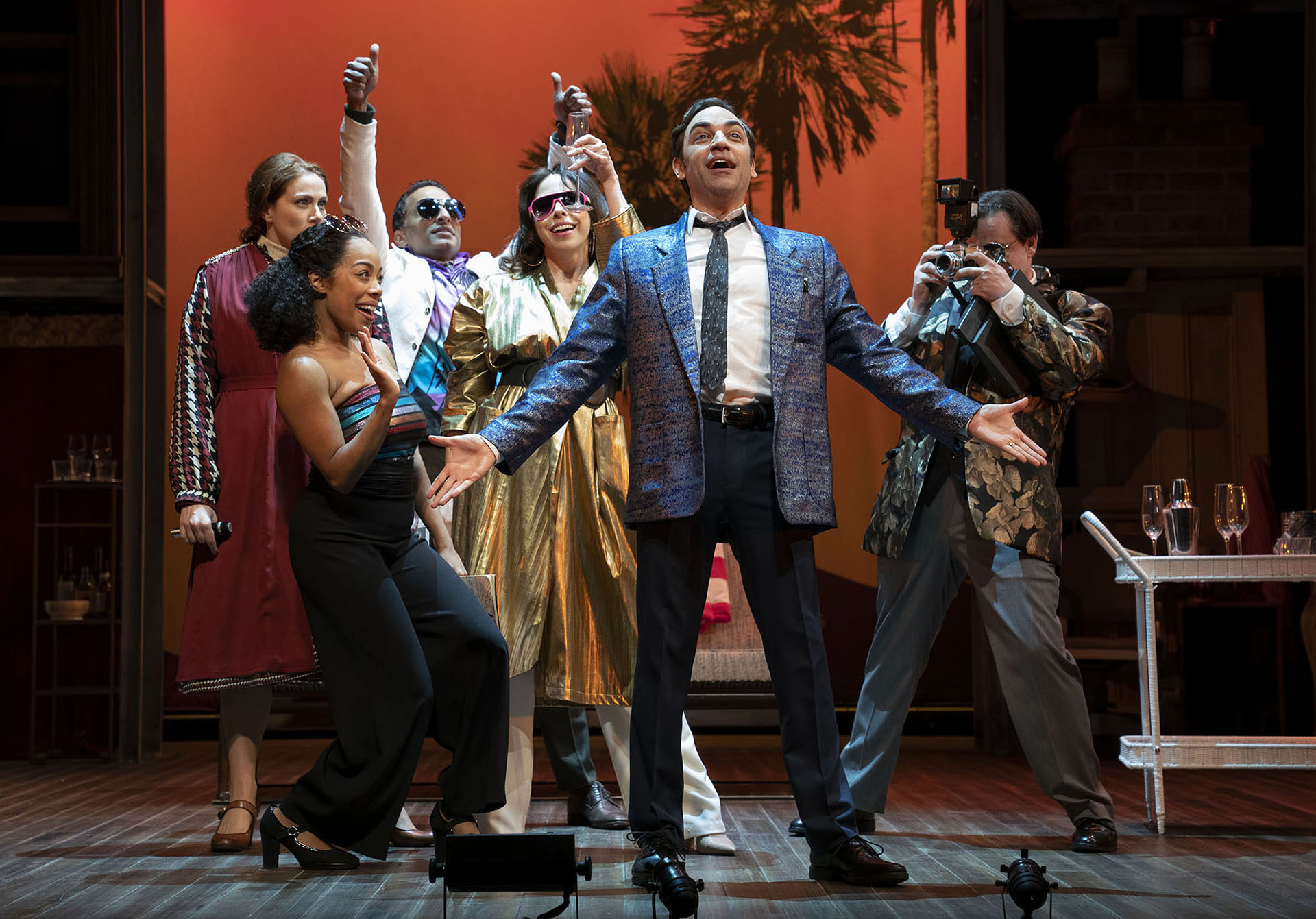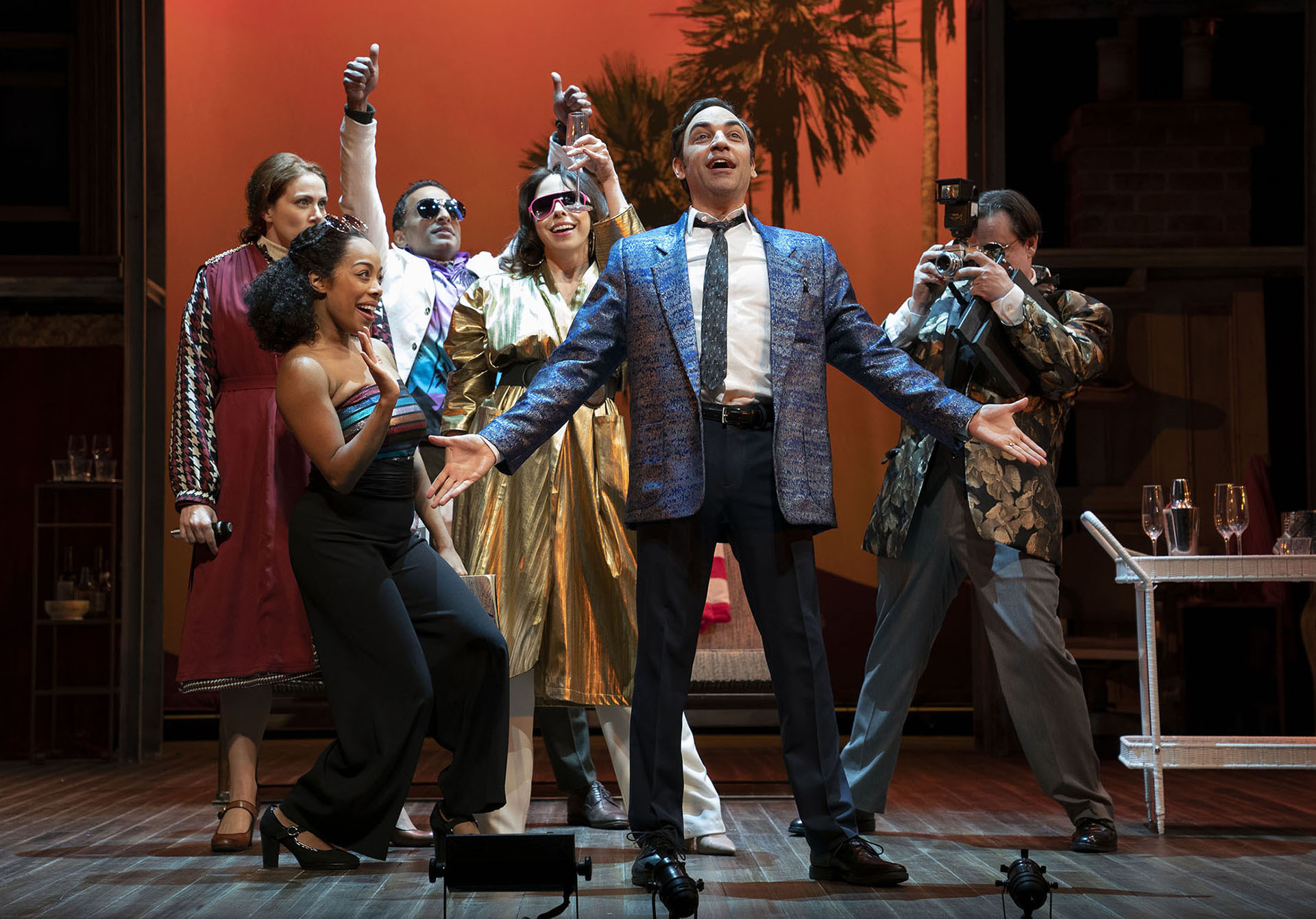The Fragility Of Artistic Relationships


The Fiasco Theater’s staging of Stephen Sondheim’s “Merrily We Roll Along,” at The Roundabout’s Laura Pels Theatre reflects on friendship, love, and loyalty. In the program notes, the artistic directors state that in reimaging the musical they drew on their own experience: “what it’s like to be old friends trying to make art together, and how important (and yet fragile) those relationships can sometimes be.”
Since its Broadway premiere in 1981, “Merrily” has been a problem play for audiences and critics. Perhaps because it’s a story about disillusionment, which is where the play begins. The narrative moves form the present, to the past, revealing how these characters arrived at their destiny.
At the center of it all, is a trio of friends. However, Frank (Ben Steinfeld), a talented and idealistic composer of Broadway musicals tosses off his wife (Jessie Austrian) and his lyricist (Manu Narayan) for Hollywood fame.
In this minimalist production, those relationships come into focus. And the satirical qualities of the musical, about making theater, and the people who create it, move swiftly and deftly to create emotionally affecting characters, along with some amusing caricatures. As Frank, Steinfeld brings a strong voice and a magnetic personality. We see how the jaded producer emerged from a brilliant young man, starting with his first Broadway hit.
At its heart, the tension here is between friends, as the youthful idealists experience it, and the fulfillment of the American Dream, as the then adults try to come to terms with it. But, like his tragic counterpart, Willy Loman (“Death of a Salesman”), Frank’s dream of prosperity and upward mobility become his own undoing. He becomes too out of touch with reality.
Austrian’s Mary morphs from the present to the past by throwing off layers of wardrobe. Seeing her first as the alcoholic theater critic, with a poisonous pen, she looks like a woman who grew fat from sitting, drinking, and indulging herself — at the expense of others, of course. As we move back in time however, we meet her as the beautiful young wife Frank will later abandon.
And as his Broadway lyricist, and business partner, Charley, Narayan is an earnest actor, portraying in a relaxed and steady manner the humanist who tries to guide Frank more wisely. It’s a confident performance. He has a beautiful voice, too!
With a small cast of six actors who sing, the show is charming and colorful. Playing a few different roles, Paul Coffey breezes through a range of iconic theater types with humor.
Director Noah Brody gets the pacing; the musical breezes by in 90 minutes. Derek McLane’s overcrowded backstage with shelves of bric-a-brac, hanging chandeliers, along with folding tables and chairs, serve a multitude of settings. But most important, the music and lyrics by Sondheim remain among his finest, including the anthemic “Our Time,” and the bitter torch song, “Not A Day Goes By.”
‘Hurricane Diane’
A fun little romp about the apocalypse, “Hurricane Diane,” at the New York Theater Workshop, delivers a necessary moral about the way we keep our bodies, our homes, and our planet. As is her wont, Pulitzer nominated Madeleine George’s new play weds disparate elements. Here, the god Dionysus, described “as a masculine person who does not identify as male,” is played by the trans actor, Becca Blackwell.
Costumed in cargo shorts and a classic Greek-style tunic, Blackwell blends silliness and swagger. Returning after centuries, the world-weary Dionysus observes, “You started to settle for ecstasy knock-offs: Creature comforts. Customer satisfaction. And at a certain point, I just stopped putting myself out there.”
In order to blend into suburban New Jersey, where the play is set, the demi-god poses as a gardener, selling services to the residents of a “Stepford Wives” kind of community. On a mission to heal the planet, Diane moves in on “the fertile zones.” But conflict arises when the demi-god’s expectation that they will be received by these women, with “an ancient cry rising from their throats,” falls short at the garden bed. So much for metaphor.
The women she needs to convince are quite the klatch, gathering in any one of their four identical kitchens daily, drinking wine, chatting, and groping for mutual support.
Most outstanding, Danielle Skraastad plays Pam Annunziata, like a real housewife of New Jersey, in faux animal print polyester dresses (by Kaye Voyce). Her god is Delfini’s, the Italian deli in town, with the mural of an Italian garden, “hanging vines, the roses, the fountain, the whole nine” that she hopes Diane will bring to life in her backyard. Hysterical!
Skrasstad’s take on this Kardashian-like character is joyfully ludicrous. Serving up priceless lessons on disaster planning, Pam boasts a police scanner atop her wet bar, and a real panic button in case of nuclear attack — paraphernalia she’s gathered as a result of life-threatening storms that are hitting the community.
She’s joined by urban cool, über hipster Renee, a magazine editor, who aims to raise chickens in her yard, played by Michelle Beck, in flowing Eileen Fischer cashmere. In contrast, Carol (Mia Barron) her neighbor is a “100 percent typical” suburban lady. So typical, we’re led to believe that it’s people like her who are actually causing the storms destroying the planetary balance.
To that end, we learn that Carol works in compliance for a pharmaceutical company whose products led to the birth of babies without hearts.
Meanwhile Beth (Kate Wetherhead), a denuded divorcee, becomes the talk of the town when the other ladies observe that “Diane might have tossed a little more than Beth’s topsoil.”
It’s an adorable dark comedy with characterizations that bring to life stereotypes of American women, and what we prize. Nature isn’t for everyone. At this rate, sex won’t be either.
George’s dialogue, with its sharp-tongued satire, tingles with wit and cultural sensitivity. It’s winsome material for Blackwell, whose Dionysus is also the play’s narrator. Helmer Leigh Silverman slays it!



